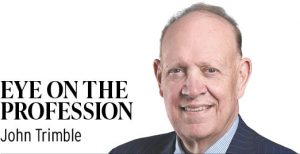Subscriber Benefit
As a subscriber you can listen to articles at work, in the car, or while you work out. Subscribe Now Earlier this year I had the pleasure to have a high school junior shadow me for a day. Our time together gave us the opportunity to discuss a range of issues related to careers in law.
Earlier this year I had the pleasure to have a high school junior shadow me for a day. Our time together gave us the opportunity to discuss a range of issues related to careers in law.
As I usually do, I asked this bright young woman why she aspired to be a lawyer. Her response concerned me.
She said, “Mr. Trimble, my family and I believe that the judicial system is broken, and I want to become a lawyer so that I can be a part of fixing it.”
As I probed her reasons for her beliefs, I learned that she held the view that judges are corrupt; that judges are beholden to the political views of whomever appoints or elects them; and that the judicial system could be weaponized against anyone. Her views were deep-seated, and there was not much that I could say to change her views.
These days, anyone who follows the news is subjected to daily stories in which both sides of the political spectrum are lambasting trial court judges and Supreme Court justices. Increasingly, the criticism of judges and justices is harsh and ugly. Judges are described as “crooked,” and cases are characterized as “fixed.”
The level and ferocity of the criticism have grown to the point that protestors have picketed the homes of judges and justices, and armed individuals have been arrested nearby. Our laws have always allowed for criticism of judicial opinions, and much criticism is deserved, but we have never seen anything like what we are seeing today.
In the last issue of Indiana Lawyer, we read a page one article entitled “A need for safety,” in which it was reported that, “Judges across the country have faced increasing threats to their personal safety in recent years, both in person and through social media.”
Chief Judge Robert Altice of the Indiana Court of Appeals described how “people are mad,” and that the majority of Indiana judges have received personal threats. More than one Indiana judge has told me that they have never received as many personal threats as they have received in the past year.
One of the better-known ideas about our judiciary is that judges should serve “without fear or favor.”
They should be able to make rulings without fear for their reputation, their job, their re-election, their safety or the safety of their family. They should be able to make rulings that do not favor one side or the other because of friendship, financial connection or party affiliation.
The subject of judicial independence was a major interest of many bar associations in the early 2000s. Justice Sandra Day O’Connor retired from the U.S. Supreme Court in January of 2006 and dedicated the balance of her working life to judicial independence through her Project on the State of the Judiciary at Georgetown Law.
I was fortunate enough during that time frame to chair a task force for DRI, the National Defense Bar, and I attended all of the symposiums hosted by O’Connor.
All of us at the time were concerned about the downward trend of public confidence in judges caused by political figures and by cable news and social media that were in their infancy. None of us imagined that it would come to what it has become today.
The judicial independence movement identified five areas of concern, which continue to exist today:
- The adequacy of funding for judicial systems.
- Judicial pay.
- Courthouse security and security for judges and their families and staff.
- The judiciary’s institutional legitimacy and accountability to the rule of law.
- Judicial selection.
All of these issues rely completely on public support for our judiciary to function as it should.
American democracy relies upon the existence of three co-equal branches. However, as public confidence in our judiciary continues to erode, our democracy is at stake. If the public does not trust our judicial system, they will not support funding, adequate pay, security and fair judicial selection methods.
We attorneys are the day-to-day consumers of our judicial system, and our clients will suffer if the system suffers. We are the ones who must speak up and speak out.
I hope that every one of you who reads this article will agree that things cannot continue in the direction they are heading. We must speak out about unfair and uncivil criticism of judges.
We must speak up to educate our communities about the role of judges, and we must do what we can to correct misperceptions about judicial rulings. We must do what we can to lower the rhetoric and do what we can to ensure that our judges can rule without fear or favor.
I encourage all of you who are bar leaders to revive discussions and initiatives within your bar associations and civic groups about judicial independence. We cannot wait another minute.
#WillYouBeThere? •
__________
John Trimble (@indytrims) is a senior partner at the Indianapolis firm of Lewis Wagner LLP. He is a self-described bar association “junkie” who admits that he spends an inordinate amount of time on law practice management, judicial independence and legal profession issues. Opinions expressed are those of the author.
Please enable JavaScript to view this content.
